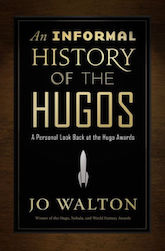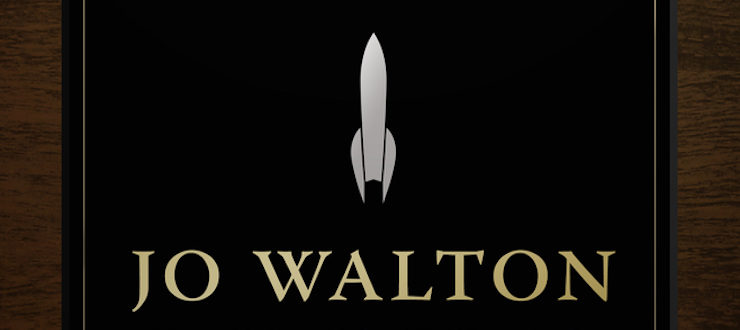The Hugo Awards, named after pioneer science-fiction publisher Hugo Gernsback, and voted on by members of the World Science Fiction Society, have been given out since 1953. They are widely considered the most prestigious awards in science fiction.
Between 2010 and 2013, Jo Walton wrote a series of posts for Tor.com, surveying the Hugo finalists and winners from the award’s inception up to the year 2000. Her contention was that each year’s full set of finalists generally tells a meaningful story about the state of science fiction at that time.
Walton’s cheerfully opinionated and vastly well-informed posts provoked valuable conversation among the field’s historians. Now these posts, lightly revised, have been gathered into An Informal History of the Hugos, along with a small selection of the comments posted by SF luminaries such as Rich Horton, Gardner Dozois, and the late David G. Hartwell. We’re pleased to share Walton’s introduction to the collection below. Available August 7th from Tor Books.
Buy the Book


An Informal History of the Hugos
In 2010, for the third time in history, there was a tie for the Best Novel Hugo Award. China Miéville’s The City & the City and Paolo Bacigalupi’s The Windup Girl had both won. Naturally, this caused discussion of the two other times there had been a tie. Mike Glyer posted on the File 770 website, saying that everyone agreed that Frank Herbert’s Dune was a better book than Roger Zelazny’s This Immortal, and Connie Willis’s Doomsday Book was better than Vernor Vinge’s A Fire upon the Deep. He said this with casual assurance, as if nobody could disagree—but I disagreed strongly, in both cases. After I was done defending Zelazny and Vinge, I started thinking about the Hugos.
They’re science fiction’s most important award—and they’re entirely fan voted and fan administered. I care about them passionately, not just as a writer but also as a fan. I have voted for them every time I’ve gone to a Worldcon and therefore been entitled to vote. There’s no financial prize, but I’ve been told that it’s the only genre award that actually affects sales of a book. The winner gets a distinctive rocket ship trophy, instantly recognizable although the inscribed bases are different every year.
I don’t think the best novel always wins. I think it’s very hard to say what the best book of the year is. Most years, there’s no single obvious best. It’s much easier to say what the top five are. I thought it might be interesting to take a historical look at the individual years and consider what was nominated and what won, to look at what else could have been nominated and wasn’t, and how well the selected books have stood the test of time. I wanted to look at the nominees to see whether the Hugos were picking the best five books, not only at the winners. It’s easy to find consideration of Hugo winners. I wanted to do something different—to revisit the winners and nominees in context.
At first I thought I couldn’t do it. I wasn’t qualified. I hadn’t read all the nominees—I hadn’t even read all the winners. (What have I been doing with my time?) The Hugo Awards were first given in 1953, and have been given continuously since 1955. If I stopped in 2000, the logical stopping point, that would be more than 250 books. I’d read a lot of them, of course, but I hadn’t read all of them. If I hadn’t read them, it was probably because I didn’t want to. Reading hundreds of books I didn’t want to read seemed like a lot of work and not much fun. Then I realized that the fact I’d not read a book was a data point. It was itself interesting. Some of it is my own taste, but some of it does depend on whether people were talking about a book. I read a lot, and I spend a lot of time talking about books. There are years where I’ve read all the nominees. So I decided I wouldn’t read anything extra for this project. If you want to read about somebody reading all the Hugo winners, or all the winners and nominees, you need to find a different book. (It wouldn’t be all that hard to find. Google offers a number of blogs where people are reading their way through Hugo winners.)
I also wanted to consider the five nominees in the context of all the other eligible books of the year, which meant looking at nominees for other awards, and also what else was available. I haven’t read all these things either, but I used my general knowledge of the history of SF to look at each year’s nominees in context.
I began a series of posts for Tor.com called Revisiting the Hugos. This was my own idiosyncratic reconsideration of all of the field, from 1953 until 2000, looking at all the Hugo nominees, at what they were, at how well they have lasted, and how well they represented the field in their year. I did this entirely from my personal knowledge and prior reading. I leaned heavily on the Locus database of awards, the Internet Speculative Fiction Database, the Fantastic Fiction UK website, and to a lesser extent on Wikipedia.
I only looked seriously at novels, though I listed all the winners in all the categories. I talked about the short fiction sometimes. I mentioned when new categories were introduced. I mentioned fanzines and fan writers from time to time. I looked at the Campbell nominees. I am a reader. I’m really not qualified to say anything about the visual categories. (In 1958, “No Award” won for Dramatic Presentation, and I cheered when I saw that. I think this excellent precedent could have been followed much more often since.) I made no attempt to be impersonal or objective—indeed, the opposite, this was very much my personal assessment of how the Hugos were doing.
As the series went on, it became very popular. Many people started commenting on it. Gardner Dozois, Rich Horton, and James Nicoll started considering the other available short fiction in the comment threads. People started to post reminiscences of their reading and the Worldcons where the awards were given. The comment threads became a fannish event, happening every Sunday morning. People argued with me about books. It became clear that I wasn’t the only one who cared about the Hugos and how well they represented the field.
What you have here is a compilation of those posts and a selection of the most interesting comments, all from 2010 and 2011, together with my posts on individual Hugo winners and nominees, all arranged chronologically, and revised slightly to avoid repetition. Updates are provided in footnotes.
The Hugo Awards are awarded annually by the World Science Fiction Society, which is to say the members of each annual World Science Fiction Convention (Worldcon). As the rules stand now, the members of the previous, current, and next Worldcons can nominate, but only members of the current Worldcon can vote. This has been slightly different at various times in the past, but the award has always been voted on by Worldcon members. In very early years, no nominees were announced and votes were made by show of hands actually at the Worldcon. This was replaced with a sensible system of transferable votes, which count preferences. Fandom has tried to keep this system as clear and open as possible, and thanks are especially due to Kevin Standlee for his efforts in this direction.
Since the Hugos have had nominees, from 1959, the nominations have been made up into short lists of the five top selections in each category, which are then voted on, in advance and by transferable votes. The winners are announced at a ceremony at the con. The long lists of all nominations with more than a certain number of votes have often been released at the same time, at least in recent years, but unfortunately not in most of the years I was looking at.
One of the metrics I used for how well books lasted was whether they were in print and whether they were in the library. For these purposes, I used my local library, the Grande Bibliothèque in Montreal. I used it because it’s my library—I had the online catalog bookmarked. It gave me an additional fortuitous advantage—I could see whether they had the book in both French and English or in only one language, which became another useful metric for judging lasting popularity.
In considering other possible nominees, I didn’t limit myself to what was plausible in the year in question. The Hugo has always been open to fantasy and to YA novels, and in recent years we have given the Hugo to things in those categories. The nominators of earlier years wouldn’t have considered them, but since we do now, I decided to take the broad view. I’m not thinking here about what the voters of any specific year considered the best. We know that, from what they selected. I’m considering whether, with the benefit of hindsight, I’m in agreement with their view.
I stopped in 2000 for three reasons. First, the ticking clock of the century seemed like a good end point. Second, it was ten years before the time when I began to write the posts, and it didn’t seem possible to have perspective on anything any closer to the present than that. If you’re considering whether a book from 1958 or 1978 has lasted, knowing it’s in print in 2010 is useful. This doesn’t work so well for a book from 1998, never mind 2008. Historical perspective takes time. The third reason was personal—I began to be published myself in 2000, and I didn’t want to either consider or not consider my own work in this context. It felt tacky. I was nominated for the John W. Campbell Award in 2001, and won it in 2002. I wanted to write about the Campbells, and I wanted to stop before I came into the frame myself.
And of course, in 2012, after I had finished this series, I won the Best Novel Hugo myself for my novel Among Others. I described my feelings about this at the time as “stunned and awed,” which I really was. I was thrilled enough to be nominated. That would have been enough. I’d written all these posts explaining how the nominees were what was important, and I truly believe that. Actually winning a Hugo myself, after writing these posts and thinking deeply about how important they were can be described only in terms of old magazine titles—Astounding, Amazing, Fantastic, Fantasy and Science Fiction!
Excerpted from An Informal History of the Hugos, copyright © 2018 by Jo Walton










